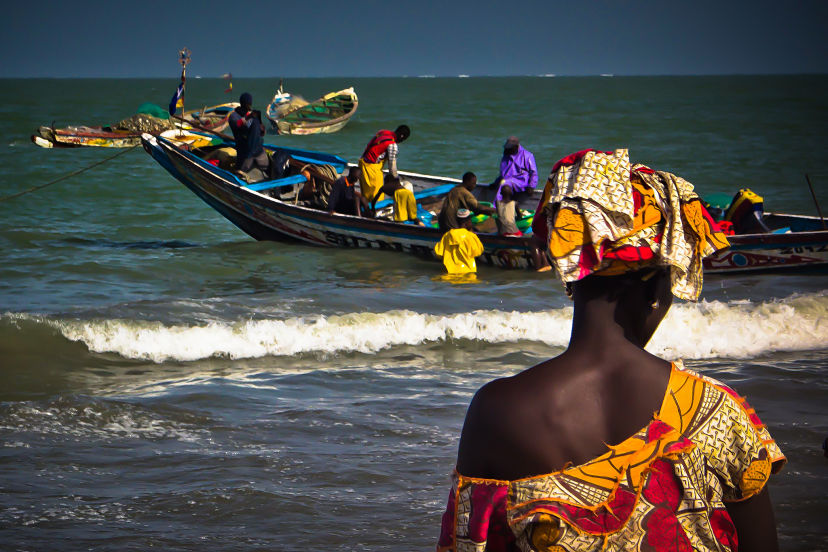Homecoming series By Da One
It was on 30th February 2018 at around 16 hours GMT when I saw 15-20 men dragging a medium sized canoe ashore in Sanyang. They pulled on the edges at rhythmic intervals, interjected with bust of songs to spur the group on. Hold-ye-hold-ye on they chanted.
The women, on the other hand, were busy descaling their meager gains of fish on the bare sandy beach in their usual colorful African attire and intermittent chatter, accompanied by laughters here and there. They use coarse knives and struggle to gut and cut the fish into pieces. I was wondering if metallic tables equipped with professional knives for gutting and descaling all kinds of fish and water hoses to wash away the dirt and residual organs will ease their burden and maximize their productivity.
I went to Sanyang purposefully to familiarize myself with conditions on the numerous coastal villages that lined the Atlantic Ocean on the shores of The Gambia. What I heard and saw for myself, left me awestruck from the incompetence of the three governments we’ve had since “independence.”
What I Saw Plus What the Fishermen and Women Told Me
At about 1700 GMT, I saw the small fishing boats hurtling on the ocean water horizon approaching the sandy shores where the day’s catch is to be offloaded. The humming sound of the boat engines gave me hope that I might be lucky to take home a sizable number of an assortment of fish to grill later in the evening. While waiting, I took some pictures with my people (i.e. all Black Africans irrespective of nationality) to later reminisce through in the cold weathers of northern Germany. Such a memorabilia keeps one at least symbolically connected to Africa in the lonely dark months of Europe.
One after the other, the boats are fetched from the water and rolled on two wheeled carts to dispose off the catches. The sun was making its first descend behind the little dark grayish yellow lights in the sky. I helped to get some of the boats anchored on dry land. Some fish was sold to me on the spot, which I quickly wrap in a synthetic bag to be enjoyed with pleasure into the wee wee hours of the night.
Then I approached a fellow called Baba to explain to me the various methods employed by the fisher folks and the economics of fishing along the coastal areas. Baba is a thick set compact man probably in his late twenties or early thirties. It took some time before I could break his indifferent demeanor towards me. But budge, he did.
My first question to him was if there are any digital technological devices they use for navigation and for the purpose of locating fish. He indicated the lack of knowledge and capital as primary hindrance that bar them from employing modern methods of fishing to maximize their yields. So, the methods of fishing used still, predominantly, is subsistent in scope and sophistication. “Our biggest problem is foreign trawlers dragging our nets”, mused in Musa Jallow cutting off Baba in mid-sentence. Before I realize what was happening, I was surrounded by a group of men who later told me they thought I was some kind of civil servant enquiring about their challenges for possible redress. Well…, civil servant or not, I became an earful about the 101 problems of your people, our people. They poured their hearts out to me for the laboriousness of their trade. Men and women who toil day in day out, leaving them completely emaciated both physically and psychologically. They asked for the conception and eventual development of a fishing infrastructure. In concession, they are willing to pay taxes or charges for the utilization of anything (cold stores, fish finders, net draggers, boat lifters, trawlers on credit, etc.) that will cut their workload and yield their investments a reasonable return. Fair enough, I thought to myself. Besides it’s not much to ask for from the “new Gambia”. This simple arrangement could yield millions of dollars in export gains for The Gambia if conscientiously implemented and managed. Why our governments are not aware of this is anyone’s guess but it’s the same reason we are losing huge amounts of money every day in the fisheries sector.
As darkness crept in, the seagulls were quacking over the fish leftovers that the women on the beach threw away either in the sand or the last ebbing-waves of the low tides. Some flying low enough to hit me on the head, others just spreading their wings and majestically gliding on the waters. Gambia truly has all it needs, except competent and incorruptible, principled men and women as leaders.
I began to make my way home not knowing whether to feel content for accomplishing my mission or reenergized to let all hell loose on this comical group called a government. Only the remaining time on my holiday will not immediately allow me to accomplish the latter. But come I shall, to pick up from where we left off.

